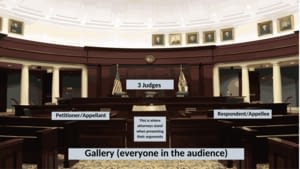Appealing a court decision in Florida can be a perplexing and overwhelming process. However, understanding the most common types of appeal cases can reveal insight into why individuals try to upset or modify a court’s decision.
This guide will dive into the most predominant appeal cases in Florida, giving you a top to bottom understanding of the legal landscape. Whether you’re thinking about an appeal yourself or just need to find out more, this article will give important bits of knowledge.
What Is an Appeal?
Before plunging into the common types of appeal cases in Florida, it’s fundamental to comprehend what an appeal is. An appeal is a legal process where a party demands a higher court to review and change the decision of a lower court. This review is regularly founded on cases of legal error, procedural mix-ups, or misinterpretations of the law. Appeals are not about re-contending the case yet rather evaluating whether the law was accurately applied.
Criminal Appeals
Criminal appeals are among the most common types of appeals in Florida. These appeals emerge when a respondent accepts that a legal error happened during their preliminary, prompting an out of line conviction or an unnecessarily cruel sentence. Here are a few common grounds for criminal appeals:
- Ineffective Assistance of Counsel
One of the most continuous explanations behind criminal appeals is the case of ineffective assistance of counsel. Respondents might contend that their attorney’s lackluster showing significantly affected the result of their case. This could incorporate inability to introduce key evidence, not appropriately questioning observers, or forgetting to file significant motions.
- Inappropriate Affirmation of Evidence
Appeals in view of the ill-advised confirmation of evidence are additionally common. If evidence that was pivotal to the arraignment’s case was inappropriately conceded (e.g., got through an unlawful hunt and seizure), the respondent might have grounds to appeal.
- Jury Misconduct
Jury misconduct, for example, hearers talking about the case beyond consultations or being affected by outer factors, can likewise prompt an appeal. If a respondent can demonstrate that jury misconduct happened, toppling a conviction might be adequate.
- Sentencing Errors
In some cases, respondents accept that their sentence was not proper given the conditions of their case. This could be because of errors in applying sentencing guidelines or because the sentence is viewed as unnecessary. In such cases, respondents might try to appeal the sentence as opposed to the actual conviction.
Civil Appeals
Civil appeals in Florida happen when one party in a civil case accepts the court made a legal error that impacted the case’s result. Civil cases include disputes between people or substances over issues like contracts, property, and family law issues. Here are the most common types of civil appeals:
- Contract Disputes
Contract disputes are a significant wellspring of civil appeals. When a party accepts that the preliminary court misjudged a contract’s terms or wrongly applied contract law, they might appeal the decision. This can include complex issues like break of contract, specific execution, and harms.
- Family Law Appeals
Family law cases, including divorce, child custody, and provision disputes, are frequently appealed. A party might contend that the preliminary court mistakenly applied the law, misconstrued evidence, or made an unjustifiable judgment. These appeals can be emotionally charged, especially when they include custody of children.
- Property Disputes
Property disputes, like conflicts over land possession, zoning issues, or property lines, can likewise prompt appeals. These cases frequently include detailed examination of property laws and the translation of deeds or contracts.
- Personal Injury and Medical Malpractice
Personal injury and medical malpractice cases are likewise commonly appealed. In these cases, the horrible party might contend that the preliminary court made an error in applying the law or that the harms granted were extreme or deficient.
Administrative Appeals
Administrative appeals include decisions made by government offices as opposed to conventional courts. In Florida, people and organizations can appeal decisions made by different state offices, for example, permitting sheets, administrative offices, and neighborhood government bodies. Common administrative appeals include:
- License Dissents or Revocations
Experts in Florida, like specialists, lawyers, and contractors, may appeal decisions connected with the refusal, suspension, or revocation of their licenses. These appeals frequently focus on whether the office followed appropriate procedures or whether the decision was supported by significant evidence.
- Zoning and Land Use Decisions
Property proprietors or engineers might appeal neighborhood government decisions connected with zoning and land use. These appeals commonly include complex issues of administrative law and nearby mandates, with the litigant contending that the public authority’s decision was erratic, eccentric, or not supported by the evidence.
- Laborers’ Compensation
Laborers’ compensation cases are much of the time appealed, particularly when there is a disagreement regarding the degree of an injury, how much advantages granted, or the forswearing of a case. Appeals in these cases can include complex medical and legal inquiries.
Appeals in Federal Courts
Notwithstanding state court appeals, a few cases in Florida include appeals in federal courts. These normally emerge from federal criminal cases, civil rights violations, or cases including federal rules. Common federal appeal cases include:
- Habeas Corpus Petitions
Habeas corpus petitions permit detainees to challenge the legality of their confinement. These cases frequently include complex constitutional issues and can be appealed through the federal court framework.
- Federal Criminal Appeals
Federal criminal appeals happen when a respondent accepts there was a legal error in their federal criminal preliminary. These cases frequently include complex issues of federal law and constitutional rights.
- Civil Rights Violations
Civil rights appeals are common in federal courts, especially when an individual accepts their constitutional rights have been disregarded by the public authority. These cases can include issues, for example, unlawful segregation, police misconduct, or violations of free discourse rights.
The Job of Appeal lawyers in Florida
Exploring the appeal process is complicated and requires particular legal knowledge. This is where best appeal lawyers in Florida become possibly the most important factor. These attorneys focus on identifying legal errors made during the preliminary, investigating pertinent case law, and introducing undeniable claims to appellate courts.
The job of an appeal lawyer is significant in both criminal and civil cases, as the success of an appeal frequently depends on the attorney’s capacity to craft a convincing legal contention.
Final Word: Why Pick Brownstone Law Appeal Lawyers?
Appealing a court decision is a serious and unpredictable legal process that requests expertise, accuracy, and experience. If you wind up expecting to appeal a case in Florida, crucial for work with gifted appeal lawyers grasp the subtleties of appellate law. Brownstone Law Appeal Lawyers spend significant time in exploring the intricacies of appeals and have a demonstrated history of success in both state and federal courts.
With a profound understanding of the most common appeal cases in Florida, including criminal, civil, and administrative appeals, Brownstone Appeal Lawyers are prepared to deal with your appeal with the highest level of impressive skill and devotion.
Their group of expert attorneys can assist you with investigating your options, decide the suitability of your appeal, and guide you through each step of the process. Whether you’re confronting a criminal conviction, a civil judgment, or a negative administrative decision, trust Brownstone Appeal Lawyers to give the legal expertise you really want to seek after justice.




